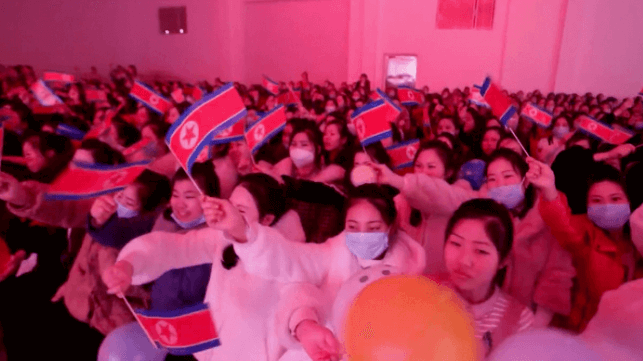The Untold Plight Of North Korean Seafood Workers in China

In February 2023, Donggang Jinhui Foodstuff, a seafood-processing company in China, threw a party. It had been a successful year: a new plant had opened, and the company had doubled the amount of squid that it exported to the United States. The party, according to videos posted on Douyin, the Chinese version of TikTok, featured singers, instrumentalists, dancers, fireworks, and strobe lights.
One aspect of the company’s success seems to have been its use of North Korean workers, who are sent by their government to work in Chinese factories, in conditions of captivity, to earn money for the state. A seafood trader who does business with Jinhui recently estimated that it employed between fifty and seventy North Koreans. When videos of the party were posted online, a commenter asked, “Aren’t you prohibited from filming this?”
The video was part of hundreds of hours of footage and other documents that proved that the Chinese government was using North Korean workers to process seafood, in violation of UN sanctions. Much of the seafood processed in these plants was destined for consumers in the U.S., which breaks federal law.
These revelations, which are part of the final episode of the newly released second season of the Outlaw Ocean podcast, sent shockwaves through the global seafood market as companies scrambled to discern whether their supply chains were compromised by a similar dependence on state-sponsored forced labor. At the risk of espionage charges and execution, two dozen North Korean workers, most of them women, also agreed to talk to the reporters about working in Chinese seafood plants. These workers recounted rampant sexual assault, violence, constant monitoring and zero access to the outside world.
Global attention on the illegal use of North Korean labor has spiked recently because of Russia’s deployment of thousands of soldiers from the Hermit Kingdom to fight in the war in Ukraine. The US state department has estimated that there are over 100,000 North Korean workers currently in China.
China officially denies that North Korean workers are in the country, but the investigation identified at least fifteen seafood processing plants that, collectively, have employed more than a thousand North Korean workers since 2017. Investigators dispatched to seafood plants in China filmed North Koreans processing seafood. After mining social media for footage of North Korean workers in Chinese seafood processing plants, investigators then used export data to tie those plants to Western buyers.
Some of the social media footage pulled from China featured people openly discussing the presence of these workers. “They are easy to distinguish,” a Dandong native wrote in a comment on Bilibili, a video-sharing site. “They all wear uniform clothes, have a leader, and follow orders.” In a video at a plant called Dandong Yuanyi Refined Seafoods, fifteen women perform a synchronized dance in front of a mural commemorating “Youth Day,” a North Korean holiday. The video features a North Korean flag and the caption, “North Korea in Donggang cold storage [with] little beautiful women.” (The company did not respond to requests for comment.)
The impact of the investigation was deep and wide. Several seafood companies severed ties with plants connected to the North Korean workers. The Congressional and Executive Committee on China held a hearing where they called for the governments of South Korea, Japan and the U.S. to work together to stop seafood products processed in China by forced North Korean labor from being imported. Members of the European Parliament sent letters to the European Commission questioning about imports of seafood tainted by state-sponsored forced labor.
While these revelations have spurred meaningful action and disrupted some supply chains, the pervasive and clandestine nature of North Korean forced labor means that, for now, the struggle against this exploitation continues.
Marcella Boehler is global publishing editor at The Outlaw Ocean Project, a non-profit journalism organization based in Washington D.C. that produces investigative stories about human rights, environment and labor concerns on the two thirds of the planet covered by water. Season Two of The Outlaw Ocean Project's podcast series may be found here.
The opinions expressed herein are the author's and not necessarily those of The Maritime Executive.
